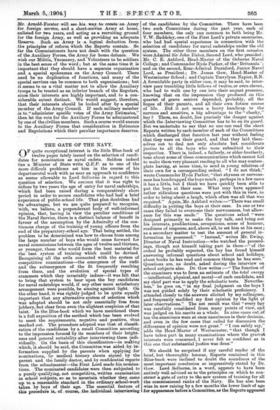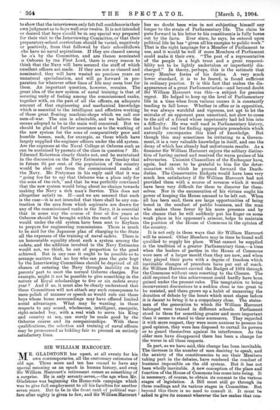O F quite exceptional interest is the little Blue-book of twelve
pages lately issued on the selection of candi- dates for nomination as naval cadets. Seldom indeed -Can a Minister of State write Q.E.F. as to one of the more difficult problems set him in the course of his departmental work with as near an approach to confidence as seems allowable to Lord Selborne in regard to this question of selection. We assume that it was right to reduce by two years the age of entry for naval cadetships, which had been raised during a comparatively short period in order to secure candidates who had had a brief experience of public-school life. That plan doubtless had its advantages, but we are quite prepared to recognise, with, we believe, a preponderant body of well-informed opinion, that, having in view the peculiar conditions of the Naval Service, there is a distinct balance of benefit in favour of the assumption by the Admiralty of the con- tinuous charge of the training of young officers from the end of the preparatory-school age. That being settled, the problem to be determined was how to choose from among the large number of boys who would come forward for naval commissions between the ages of twelve and thirteen, or younger, those who would form the best material for the best system of training which could be devised. Recognising all the evils connected with the system of competitive examinations—the emergence of the unfit and the submergence of the fit frequently resulting from them, and the evolution of special types of crammers which they invariably induce—it was felt that to bring that system to bear upon the boy candidates for naval cadetships would, if any other more satisfactory arrangement were possible, be sinning against light. On the other hand, it was rightly judged to be quite equally important that any alternative system of selection which was adopted should be not only essentially free from jobbery, but clear from even the slightest suspicion of that taint. In the Blue-book which we have mentioned there is a full exposition of the method which has been evolved to meet the requirements, negative and positive, thus marked out. The procedure adopted was that of classifi- cation of the candidates by a small Committee according to the impression formed by its members of their bright- ness and general suitability after interviewing them indi- vidually. On the basis of this classification—in maling which, it should be said, the Committee was aided by in- formation supplied by the parents when applying for nominations, by medical history sheets signed by the parent and the family doctor, and by confidential reports from the schoolmaster—the First Lord made his nomina- tions. The nominated candidates were then subjected to a purely qualifying, not competitive, written examination in school subjects, so as to ascertain whether they came up to a reasonable standard in the ordinary school-work taken by boys of their age. The essential feature of this procedure is, of. course, the individual inkaTiewing of the candidates by the Committee. There have been two such Committees during the past year, each of four members, the only one common to both being Mr. V. W. Baddeley, one of the First Lord's private secretaries, who had had special experience in connection with the selection of candidates for naval cadetships under the old system. The other three members on the first occasion were Admiral Sir John Fisher, Second Lord, who presided ; Mr. C. E. Ashford, Head-Master of the Osborne Naval College ; and Commander Hyde Parker, of the Britannia ' ; and on the second, Rear-Admiral Durnford, Junior Naval Lord, as President ; Dr. James Gow, Head-Master of Westminster School ; and Captain Trevylyan Napier, R.N. A formidable party in either case, it may be said, to inter- view poor trembling little fellows of twelve, or even eleven, who had to walk one by one into their august presence, knowing that on the impression they produced on this quartet of grave seniors depended, probably, all the hopes of their parents, and all their own future course of life. Did it not mean a heavy handicap to the nervous and sensitive, a big advantage to the "cheeky," boy ? There, no doubt, lies precisely the danger against which the Interviewing Committee has to be on its guard. But we undertake to say that no one can read the short Reports written by each member of each of the Committees which discharged that function last year without feeling that they were on their guard, and that they laid them- selves out to deal not only absolute but considerate justice to all the boys who were submitted to their inspection. There is, indeed, a fatherly, or elder-brotherly, tone about some of these communications which cannot fail to ma,ko them very pleasant reading to all who may contem- plate having, at some time, to send in young relatives of their own for a corresponding ordeal. "I do not think," wrote Commander Hyde Parker, "that shyness or nervous- ness has handicapped the boys much ; perhaps in a few cases it has a little, but I think we have quickly been able to put the boys at their ease. What may have appeared rather ridiculous questions were put with this in view, in order to bring about a laugh, which often was all that was required." Again, Mr. Ashford writes:—" There was small difficulty in putting the boys at their ease. In one or two cases they failed to overcome their nervousness, but allow- ance for this was made." The questions asked "were designed primarily to make the boy talk, and bring out his interests, predilections, occupations, sense of humour, readiness of response, and, above all, to set him at his ease ; as a secondary matter to test the amount of general in- formation he possessed." "Instead," writes Mr. Ewing, Director of Naval Instruction—who watched the proceed- ings, though not himself taking part in them—" of the ordeal he probably expected, the boy has found himself answering informal questions about school and holidays, about books he has read and common things he has seen." Questions are, no doubt, asked during the interview on school subjects also. Dr. Gow writes :—" The function of the examiners was to form an estimate of the total energy —intellectual, physical, and moral—of each candidate, and my chief part was to apply the scholastic tests. Neverthe- less," he goes on, "in my final judgment on the boys I was not guided solely by their scholastic proficiency. I attended closely to the answers elicited by my colleagues. and frequently modified my first opinion by the light of later observations." The net result was that "every bpy was carefully considered from many points of view, and was judged on his merits as a whole. In nine cases out of ton the examiners were at once unanimous in their decision, and even in the few cases that called for discussion the differences of opinion were not great." "I can safely say," adds the Head-Master of Westminster, "that though I have taken part in many examinations where the gravest interests were concerned, I never felt so confident as in this one that'substantial justice was done."
We should be surprised if any careful reader of the brief, but thoroughly human. Reports contained in this Blue-book were inclined to doubt the soundness of the most important conclusion so impressively stated by Dr. Gow. Lord Selborne, in a word, appears to have been .entirely well advised as to the principles on which to con- struct a gate of entry to the new system of training for all the commissioned, ranks of the Navy. He has also been wise in now raising by a few months the lower limit of age for appearance before a Committee, as the Reports appeared to show that the interviewers only felt full confidence in their own judgment as to boys well over twelve. It is not intended or desired that boys should be in any special way prepared for their visit to the Interviewing Committee, or that their preparatory-school curriculum should be varied, negatively or positively, from that followed by their schoolfellows xlio have no naval aspirations. If they are classed among -he a's by the Committee, and are thence nominated k) Osborne by the First Lord, there is every reason to think that the Navy will have secured the stuff of which excellent officers are made. If they are not so classed and nominated, they will have wasted no precious years on unnatural specialisation, and will go forward in pre- paration for whatever other lines of life may seem best for them. An important question, however, remains. The great idea of the new system of naval training is that of securing unity of feeling among the commissioned ranks, together with, on the part of all the officers, an adequate amount of that engineering and mechanical knowledge which is essential to the intelligent and effective working of those great floating machine-shops which we call our men-of-war. The aim is admirable, and we believe the means adopted to be in the main well conceived. But we should be glad of further assurance as to the working of the new system for the sons of comparatively poor and humble homes, such, for example, as those which have largely supplied the engineer officers under the old system. Are the expenses at the Naval College at Osborne such as can be sustained by parents of the class in question ? Mr. Edmund Robertson clearly thinks not, and he maintained in the discussion on the Navy Estimates on Tuesday that in future 95 per cent, of the population of the country , would be shut out from the commissioned ranks of the Navy. Mr. Pretyman in his reply said that it was "going too far to say that Osborne was a place only for the sons of the rich," and that he was perfectly convinced that the new system would bring about no'change towards making the Navy a rich man's Service. This does not altogether satisfy us. If—and we are assured that such is the case—it is not intended that there shall be any con- traction in the area from which aspirants are drawn for any of the commissioned ranks in the Navy, it is essential that in some way the course of four or five years at Osborne should be brought within the reach of boys who would under the old system have been sent to Keyham to prepare for engineering commissions. There is much to be said for the Japanese plan of charging to the State all the expenses of the training of naval cadets. There is an honourable equality about such a system among the cadets, and the addition involved to the Navy Estimates would not, we think, be out of proportion to the good achieved. But in any case it ought to be possible so to arrange matters that no boy who can pass the gate kept by the Interviewing Committees should be deprived of all chance of entering the Navy through inability on his parents' part to meet the normal Osborne charges. For example, might it not be possible to give something in the nature of Royal scholarships to five or six cadets every year ? And if so, it must also be clearly understood that these Committees will not attach any such consequence to mere polish of manner or speech as would rule out those boys whose home surroundings may have offered limited social advantages. What may be wanting in those respects to any sound, wholesome, intelligent, energetic, right-minded boy, with a real wish to serve his King and country at sea, can surely be made good by the Osborne course and its companionships. With these qualifications, the selection and training of naval officers may be pronounced as bidding fair to proceed on entirely satisfactory lines.











































 Previous page
Previous page